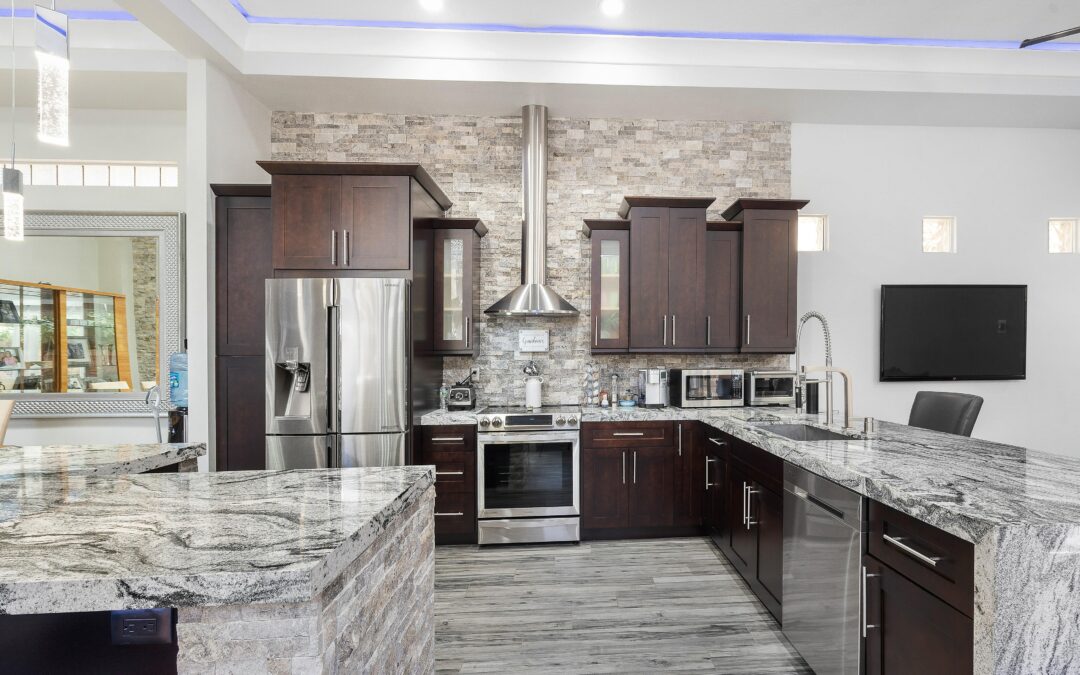When it comes to countertops, today’s popular debate is quartz vs granite types. The two countertop materials are consumer favorites for every room from the kitchen and bathroom to outdoor bars and laundry room counters. For many homeowners building a new home or considering a remodel, beautiful, high-quality countertops are on the top of the priority list.
So, how do you choose between the two materials? Both granite and quartz offer wonderful benefits for any home, but if you’re not sure which option is right for you, here’s a complete list of pros and cons to help you make the quartz vs granite decision.
Let’s start by defining what each material actually is:
What is Quartz?
Quartz is actually a man-made material. It’s made up of about 90-95 percent quartz and 5-10 percent resin, and is also referred to as engineered stone. Manufacturers take leftover or already-found quartz and stone, grind it up and mix it together with a resin to create a beautifully durable countertop material.
Quartz, the stone, naturally occurs in a variety of colors, from pinks and creams and whites to purples and blues. Engineered stone quartz materials can be left naturally colored, or they can be enhanced by the manufacturer to achieve a particular color or pattern. Since quartz is manufactured, it can be created in a variety of slab sizes and shapes.
What is Granite?
Granite is a 100% naturally occurring rock. Granite is an igneous rock, which means it’s formed over time by the cooling of molten lava. As lava cools and compresses over centuries, it forms the flecks and striations we’re used to seeing in impressive granite slabs. Granite is made up of a number of different minerals, giving every granite slab different colors and characteristics.
Granite is harvested in a quarry, where it’s cut to manageable slab sizes. From there it’s sent to the supplier, where it’s polished to achieve that characteristic shine, and then cut again to fit your bathroom countertop or kitchen island size.
Quartz Vs. Granite: The Pros and Cons
Now that we know how each type of countertop is made, let’s get into their differences in performance. For the most part, the decision between granite and quartz comes down to personal choice — but you will see different benefits from each option:
Appearance
When you choose granite countertops, you’ll find that there’s no other rock out there exactly like the one you’ve chosen. Granite is naturally occurring, which means engineers can’t dictate its patterns or colors. Instead, you end up with something totally unique in both color and pattern.
This is an amazing benefit, but it’s also something to consider if you plan on a huge kitchen or a great deal of counter space; since granite is naturally occurring, you’re not always guaranteed a uniform look throughout your kitchen or bathroom. No two slabs of granite are exactly the same, so if you need to use more than one slab, your counters may not match perfectly.
Quartz, on the other hand, gives you a bit more control. Quartz is manufactured, which means it often features repeating patterns and colors. It also means that no matter the size of your kitchen, bathroom, or countertops, you’ll be able to find countertops that match precisely.
For an example, check out Cambria’s selection of high-quality quartz slab options. Cambria is able to name and sell specific designs because the manufacturing process ensures that each color and pattern is repeatable. This makes quartz countertops a great option for those who know exactly what they want, and who are looking for a specific, unified look.
Durability
Both quartz and granite are very durable materials — people wouldn’t make countertops out of them if they weren’t! Granite ranks somewhere between a 6 and 7 on the Moh’s hardness scale, while quartz is a consistent 7. This means they’re some of the hardest countertop materials on the market.
Since granite is completely natural, it’s not unusual to have the occasional flaw, just like any other naturally occurring rock. While most of these only add to the granite’s overall visual effect, they can sometimes cause cracks and make it difficult for countertop installers to cut the rock precisely.
Quartz, however, can be cut at any point to achieve the perfect look, without concern. Since it’s man-made, it can be engineered without imperfections, ensuring precisely cut slabs, and no danger of cracking.
Both quartz and granite are exceptionally durable materials. But like anything, if you drop a heavy cast-iron pan just right on the edge or corner, it’s possible that enough force could cause a chip, scratch, or crack. While this is extremely unlikely, it’s important to remember that nothing is completely indestructible.
Maintenance
Many people choose quartz or granite because of their long-lasting durability and ease of care, but the two different materials do require different levels of upkeep.
Maintaining Granite
Granite takes a bit of regular upkeep because it’s moderately porous. To keep liquids and food from seeping in, it requires sealing. Granite suppliers recommend you wipe down granite countertops every day with a bit of warm water and a mild soap.
It’s also important that you clean up any spills from foods or liquids that could cause major stains as soon as possible. Spills like red wine or beet juice could cause slight discoloration if not cleaned up quickly. It’s also recommended that you have granite countertops resealed every year or so, to maintain their longevity.
Maintaining Quartz
When it comes to maintenance, quartz is the decided winner. Since it’s manufactured with resin, quartz is nonporous, which means you don’t need to worry about stains seeping into the material. Simply clean stains with a non-abrasive, mild soap and water combination, and polish with a cotton cloth if desired.
Do note that due to the resin in engineered quartz, it’s important to avoid placing very hot pots or pans on quartz surfaces. This can lead to slight discoloration, so remember to always use a hot pad or trivet when working with hot pans on your quartz counters.
Cost
When you’re building a home or planning a remodel, you have to plan your budget. For many, cost could be the deciding factor when choosing between quartz or granite countertops. Let’s take a look at how the cost typically breaks down for the two materials.
No matter how you look at it, quartz and granite alike are higher-end countertop materials. At the most basic level, granite will start out at a lower material cost than quartz, but both materials can go to a high cost-per-square-foot for top-quality.
According to our Kitchen & Bath sales and design team, granite can range from $55-$100 per square foot, while quartz can range from around $60-$100 per square foot. You’ll have to add the cost of installation on top of the material cost, but the biggest difference in price will come from the quality of the material and the demand of the particular color or pattern you’re looking for.
For example, an exquisitely colored granite slab that’s the only one of its kind is likely to be far more expensive than an engineered quartz slab. On the other hand, a more basic granite slab — in common black or brown colors — will be less expensive than a brand name quartz slab. Generally, the price will come down to the exact look you’re going for, rather than the material you choose.
In the end, both quartz and granite are attractive countertop options. Granite is perfect for the homeowner or builder looking for a one-of-a-kind appearance that’s sure to make a dramatic impression. Quartz can also offer a luxurious style, combined with exceptional durability and easy maintenance. The choice will ultimately depend on the style you prefer for your home’s finished look.
If you’re looking for beautiful countertops to complete your new kitchen — either quartz or granite — Zeeland Lumber & Supply has the materials you need and the brands you want. Check out our selection of top-of-the-line countertops online today, or stop into one of our showrooms to take a look at what we’ve got to offer!


